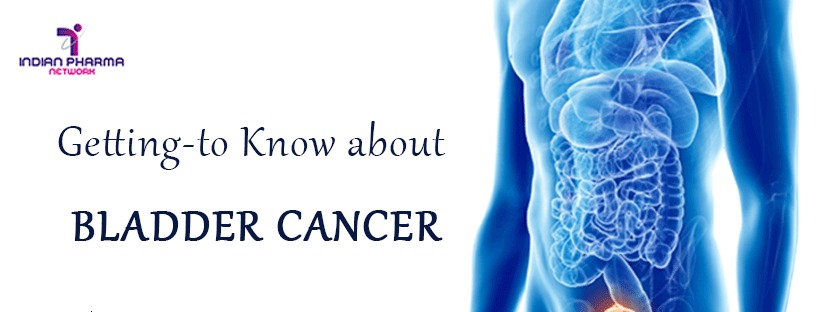Getting-to Know about Bladder Cancer
Adjusting to life with and beyond any type of cancer can sometimes be difficult. It can be something of an emotional rollercoaster, and you can also face some practical issues as life and time move forward with it. If you are having the support of the best guiding medical research team and network, then this rollercoaster journey might become smooth at some point in life.
Today, we will be knowing about bladder cancer. Despite the rate of incidence and the high levels of recurrence and mortality, bladder cancer has been overlooked for a long time in terms of research spending. Bladder cancer is the sixth most common cancer globally and the ninth most common cancer in India. It is likely to be diagnosed four times in men than in women. In this writeup, we will take a closer look at the likelihood of bladder cancer along with its risk factors, symptoms, survival rates, treatment and providing some tips to reduce the risk of bladder cancer.
Knowing the role of Bladder. What is Bladder Cancer?
The bladder is a hollow, flexible pouch in your pelvis. It is the part of the body which collects and stores the urine from kidneys before disposal by urination. The bladder can get bigger or smaller as it fills with urine. Urine reaches the bladder through tubes called ureters.
When cells of the bladder grow abnormally and crowd out normal cells, they can harm the functioning of the body. Bladder cancer most often begins in the cells (urothelial cells) that line the inside of your bladder. Urothelial cells are the cells founded in kidneys and the tubes (ureters) that connect the kidneys to the bladder.
What are the major risk factors?
The major risk factors for bladder cancer in India include tobacco smoking, industrial exposure to potential carcinogens such as aromatic amines and carbon black dust, long-term drinking of arsenic-contaminated or chlorinated water, and family history of prostate, endometrial and bladder cancers. Researches in India shows that bladder cancer was more prevalent among labourers, industry workers of leather and textile factories, hair-dye handlers and shoe-makers, people over the age of 55, people having low fluid consumption and having a high-fat diet.
How to know if you are suffering from Bladder Cancer? What are the stages of Bladder Cancer?
People with bladder cancer may experience the following symptoms. Sometimes, people with bladder cancer do not have any of these changes. It is advisable to get regular screening tests done.
- Blood in urine, Pain or burning sensation during urine
- Frequent urination, Urgent urination, urinary incontinence
- Pain in the abdominal area and lower back
If you are experiencing these symptoms, you better get diagnosed because early detection is the only key to leading a healthy life. Your doctor may diagnose you through a urinalysis, an internal examination, a cystoscopy, a biopsy, or a CT Scan.
Your doctor can rate bladder cancer with a staging system that goes from stages 0 to 4 to identify how far cancer has spread. The four stages are:
- Stage 0– Bladder cancer has not spread past the lining of the bladder.
- Stage 1– Bladder cancer has spread past the lining of the bladder, but it has not reached the layer of muscle in the bladder.
- Stage 2– Bladder cancer has started spreading to the layer of muscle in the bladder.
- Stage 3– Bladder cancer has started spreading into the tissues that surround the bladder.
- Stage 4– Bladder cancer has started spreading to the other parts of the body.
Discussing the types of Bladder Cancer
Transitional Cell Carcinoma (TCC)
Also known as Urothelial carcinoma, it occurs in the cells that line the inside of the bladder. Urothelial cells expand when your bladder is full and contract when it is empty. Depending upon their spread to the muscle layer, they can be invasive or non-invasive. Invasive cancers are hard to treat.
Squamous Cell Carcinoma
This type of cancer constitutes about 1–2% of bladder cancers. It occurs in the thin, flat cells on the surface of bladder tissue. Most squamous cell cancers are invasive.
Adenocarcinoma
About 1% of bladder cancers are adenocarcinomas. It occurs in the cells of the bladder glands that secrete mucus.
Sarcoma
It is a rare type of bladder cancer that originates in the muscle cells of the bladder.
Elaborating on Survival Rate and Treatment
As the outlook on survival rate depends on a lot of variables, including type and stage of cancer. Check out the five-year survival rate by stage:
Stage 0 Bladder Cancer: 98 Percent
Stage 1 Bladder Cancer: 88 Percent
Stage 2 Bladder Cancer:63 Percent
Stage 3 Bladder Cancer:46 Percent
Stage 4 Bladder Cancer:15 Percent
When it comes to treating bladder cancer, different stages of cancer require different treatments. It also depends upon other factors like the location and stage of cancer, the individual’s overall health, their age and their personal preferences. The patient can choose among surgery, chemotherapy, biological therapy, and radiation therapy upon consulting the doctor.
Prevention
While we say, “Prevention is better than Cure”, we should also adhere to it. Following certain lifestyle practices may help a person reduce the risk of bladder cancer:
- Do not Smoke
- Take extra precautions when around chemicals
- Drink plenty of water
- Maintain a healthy diet by eating a variety of fruits and vegetables
Do remember to consult the doctor if you often feel the symptoms mentioned above and get your diagnosis done as soon as possible. Connect with best pharmaceutical consultants at Indian Pharma Network as we will assist you with the best advice and any medication that you need from any part of the globe.
Visit: https://indianpharmanetwork.co.in/
Or
Call Mr Neeraj Nagpal on 9811747774
References:


